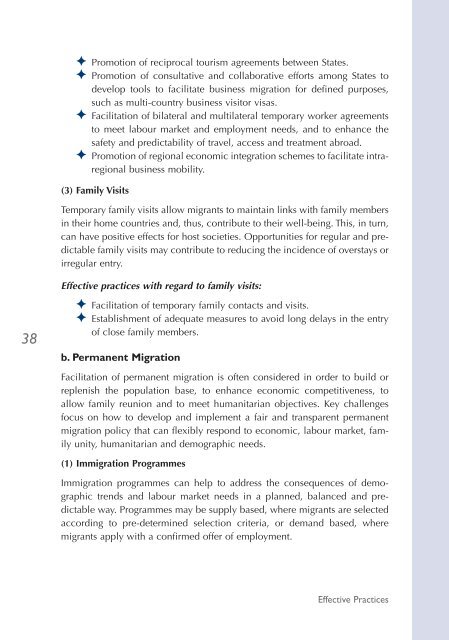Chapitre III - UNITAR
Chapitre III - UNITAR
Chapitre III - UNITAR
You also want an ePaper? Increase the reach of your titles
YUMPU automatically turns print PDFs into web optimized ePapers that Google loves.
38<br />
Promotion of reciprocal tourism agreements between States.<br />
Promotion of consultative and collaborative efforts among States to<br />
develop tools to facilitate business migration for defined purposes,<br />
such as multi-country business visitor visas.<br />
Facilitation of bilateral and multilateral temporary worker agreements<br />
to meet labour market and employment needs, and to enhance the<br />
safety and predictability of travel, access and treatment abroad.<br />
Promotion of regional economic integration schemes to facilitate intraregional<br />
business mobility.<br />
(3) Family Visits<br />
Temporary family visits allow migrants to maintain links with family members<br />
in their home countries and, thus, contribute to their well-being. This, in turn,<br />
can have positive effects for host societies. Opportunities for regular and predictable<br />
family visits may contribute to reducing the incidence of overstays or<br />
irregular entry.<br />
Effective practices with regard to family visits:<br />
Facilitation of temporary family contacts and visits.<br />
Establishment of adequate measures to avoid long delays in the entry<br />
of close family members.<br />
b. Permanent Migration<br />
Facilitation of permanent migration is often considered in order to build or<br />
replenish the population base, to enhance economic competitiveness, to<br />
allow family reunion and to meet humanitarian objectives. Key challenges<br />
focus on how to develop and implement a fair and transparent permanent<br />
migration policy that can flexibly respond to economic, labour market, family<br />
unity, humanitarian and demographic needs.<br />
(1) Immigration Programmes<br />
Immigration programmes can help to address the consequences of demographic<br />
trends and labour market needs in a planned, balanced and predictable<br />
way. Programmes may be supply based, where migrants are selected<br />
according to pre-determined selection criteria, or demand based, where<br />
migrants apply with a confirmed offer of employment.<br />
Effective Practices
















